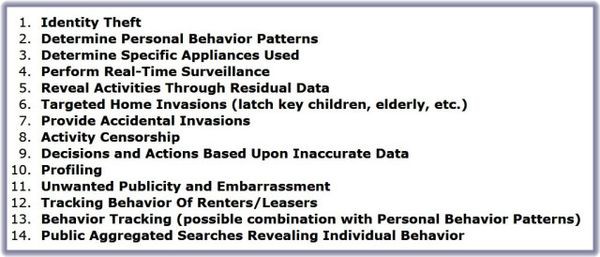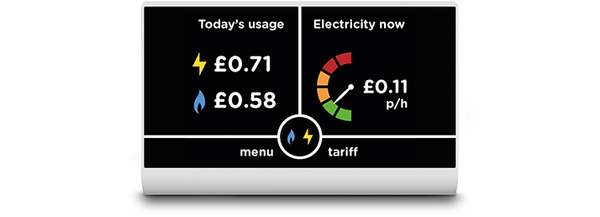Although many people claim that smart meters invade their privacy, it is unclear as to whether a compelling argument has yet been fully made that properly articulates an invasion of privacy assertion in a way that is understandable or convincing enough to persuade a sufficient number of legislators, governmental officials, court judges, or hearing officers. It is the purpose of this website posting to help formulate such a message.
The principal privacy and security concerns surrounding installation of residential smart meters are (1) smart meters will reveal the activities of people inside of a home by measuring their electricity, gas, or water usage frequently over time, and (2) that inadequate cyber security measures surrounding the digital transmission of smart meter data will expose it to misuse by authorized and unauthorized users of the data.
More specifically, the Electronic Privacy Information Center (EPIC), a non-profit group, has listed on its website the following potential privacy consequences of smart grid and smart meter systems:

Let us highlight just one item from the above list which has received little or no prior attention, “Tracking Behavior of Renters/Leasers.” When a different individual owns and pays the utilities other than the resident, such as in the case of a rental unit, apartment subletting, leasing, and so on, the landlord or property owner will likely have “authorized” and easy access to the smart meter data through a utility online portal website. The renter’s electricity, gas, and possibly water usage patterns and behavior could be monitored in near real-time. Hypothetically, a landlord could use information obtained from smart meter data to determine whether the tenant has broken a lease provision or for other more malicious purposes. The utility would likely claim that it has no concern or control over such activities, yet the utility is installing the technology that allows this avenue of privacy invasion to occur. [For a discussion describing the context of each item on the above list, refer to the following link: Potential Privacy Impacts.]

Although utilities largely dismiss the above privacy and security concerns when voiced by consumers, the author of this document asserts that smart meters do indeed represent an invasion of privacy that is unreasonable and unnecessary. Without quoting specific case law for purposes of this website posting, let it be said that the general legal criteria for demonstrating an invasion or privacy allegation consists of satisfying two discrete questions:
- The first question relates to whether an individual, by his or her conduct, exhibits a subjective expectation of privacy, i.e., has the individual shown that he or she seeks to preserve something as private.
- The second question pertains to whether the individual’s subjective expectation of privacy is one that society is prepared to recognize as reasonable, i.e., whether the individual’s privacy expectation, viewed objectively, is justifiable under the circumstances.
Read the full article from here

